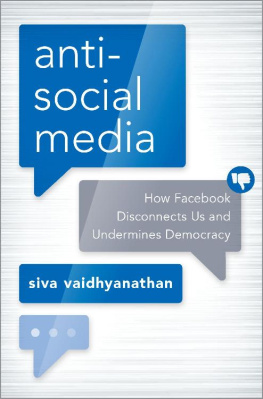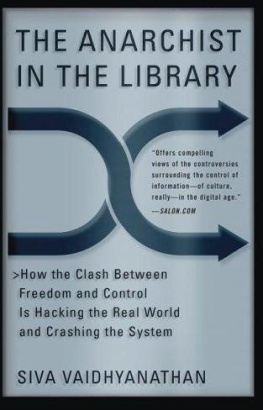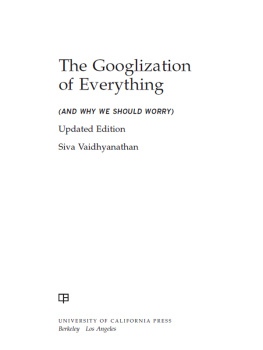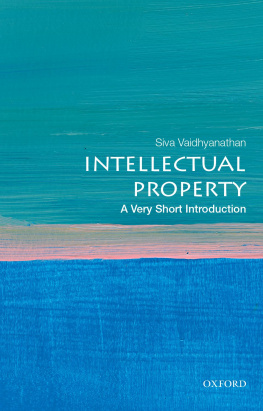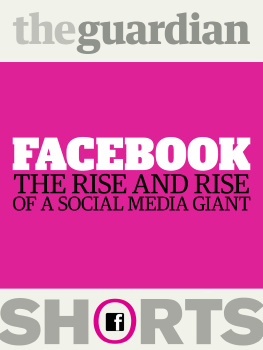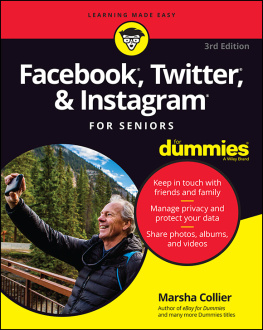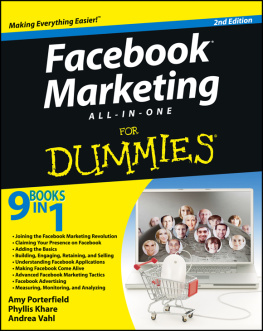ANTI-SOCIAL MEDIA
SIVA VAIDHYANATHAN
ANTI-SOCIAL MEDIA
How Facebook Disconnects Us and Undermines Democracy
Oxford University Press is a department of the University of Oxford.It furthers the Universitys objective of excellence in research, scholarship, and education by publishing worldwide. Oxford is a registered trade mark of Oxford University Press in the UK and in certain other countries
Published in the United States of America by Oxford University Press 198 Madison Avenue, New York, NY 10016, United States of America
Siva Vaidhyanathan 2018
All rights reserved. No part of this publication may be reproduced, stored in a retrieval system, or transmitted, in any form or by any means, without the prior permission in writing of Oxford University Press, or as expressly permitted by law, by license, or under terms agreed with the appropriate reproduction rights organization. Inquiries concerning reproduction outside the scope of the above should be sent to the Rights Department, Oxford University Press, at the address above.
You must not circulate this work in any other form and you must impose this same condition on any acquirer
A copy of this books Cataloging-in-Publication Data is on file with the Library of Congress.
ISBN 9780190841164
1 3 5 7 9 8 6 4 2
Printed by Sheridan Books, Inc., United States of America
To my parents
Some claim the world is gradually becoming united, that it will grow into a brotherly community as distances shrink and ideas are transmitted through the air. Alas, you must not believe that men can be united in this way. To consider freedom as directly dependent on the number of mans requirements and the extent of their immediate satisfaction shows a twisted understanding of human nature, for such an interpretation only breeds in men a multitude of senseless, stupid desires and habits and endless preposterous inventions. People are more and more moved by envy now, by the desire to satisfy their material greed, and by vanity.
Fyodor Dostoevsky, The Brothers Karamazov (1880)
CONTENTS
ANTI-SOCIAL MEDIA
INTRODUCTION
The Problem with Facebook Is Facebook
On the afternoon of June 27, 2017, Mark Zuckerberg posted a brief message on his Facebook page. As of this morning, the Facebook community is now officially 2 billion people! the company founder and chief executive officer wrote. Were making progress connecting the world, and now lets bring the world closer together. Its an honor to be on this journey with you.
The idea of bringing the world closer together has animated and driven Zuckerberg from the beginning. His speeches, his letters to investors, his essays on Facebook, his interviews with journalists, and the quiet tour he took of the United States in early 2017 all resonate with that theme. He believes that his company can and should unite people from across the globe. He also believes that the consequences of that process of connecting people are predictable and largely beneficial.
For the past decade, Facebook has focused on connecting friends and families, Zuckerberg wrote in a wide-ranging manifesto he published on his Facebook page in early 2017. With that foundation, our next focus will
Beyond voting, the greatest opportunity is helping people stay engaged with the issues that matter to them every day, not just every few years at the ballot box, Zuckerberg wrote in that 2017 manifesto. We can help establish direct dialogue and accountability between people and our elected leaders. Then Zuckerberg chose to mention some of the most astounding examples of how he believed Facebook helps democratic processes. In India, Prime Minister Modi has asked his ministers to share their meetings and information on Facebook so they can hear direct feedback from citizens, Zuckerberg wrote. In Kenya, whole villages are in WhatsApp (a messaging platform that Facebook owns) groups together, including their representatives. In recent campaigns around the worldfrom India and Indonesia across Europe to the United Statesweve seen the candidate with the largest and most engaged following on Facebook usually wins. Just as TV became the primary medium for civic communication in the 1960s, social media is becoming this in the 21st century.
Those who study or follow the rise of authoritarianism and the alarming erosion of democracy around the world would by 2017 list India, Indonesia, Kenya, Poland, Hungary, and the United States as sites of Facebooks direct contribution to violent ethnic and religious nationalism, the rise of authoritarian leaders, and a sort of mediated cacophony that would hinder public deliberation about important issues, thus undermining trust in institutions and experts. Somehow, Zuckerberg missed all of that. By November 2017,
In the manifesto Zuckerberg did describe a central problem with Facebook that led to so many unwelcome developments. These mistakes are almost never because we hold ideological positions at odds with the community, but instead are operational scaling issues, he wrote. Facebook is just too big to govern. We are victims of its success.
The story of Facebook has been told well and often. But it deserves a deep and critical analysis at this crucial moment. Somehow Facebook devolved from an innocent social site hacked together by Harvard students into a force that, while it may make personal life just a little more pleasurable, makes democracy a lot more challenging. Its a story of the hubris of good intentions, a missionary spirit, and an ideology that sees computer code as the universal solvent for all human problems. And its an indictment of how social media has fostered the deterioration of democratic and intellectual culture around the world.
Silicon Valley grew out of a widespread cultural commitment to datadriven decision-making and logical thinking. Its culture is explicitly cosmopolitan and tolerant of difference and dissent. Both its market orientation and its labor force are global. Silicon Valley also indulges a strong missionary bent, one that preaches the power of connectivity and the spread of knowledge to empower people to change their lives for the better.
So how did the greatest Silicon Valley success story end up hosting radical, nationalist, anti-Enlightenment movements that revolt against civic institutions and cosmopolitans? How did such an enlightened firm become complicit in the rise of nationalists such as Donald Trump, Marine Le Pen, Narendra Modi, Rodrigo Duterte, and ISIS? How did the mission go so wrong? Facebook is the paradigmatic distillation of the Silicon Valley ideology. No company better represents the dream of a fully connected planet sharing words, ideas, images, and plans. No company has better leveraged those ideas into wealth and influence. No company has contributed more to the paradoxical collapse of basic tenets of deliberation and democracy.
POLLUTION
On February 2, 2012, about a year before President Barack Obama would take his second oath of office and a year after the abdication of Egyptian president Hosni Mubarak, Zuckerberg released a remarkable letter to his shareholders. People sharing moreeven if just with their close friends or familiescreates a more open culture and leads to a better understanding of the lives and perspectives of others, Zuckerberg wrote in the letter. We believe that this creates a greater number of stronger relationships between people, and that it helps people get exposed to a greater number of diverse perspectives. By helping people form these connections, we hope to rewire the way people spread and consume information. The letter, issued just weeks before the companys $16 billion initial public offering of stock, was the strongest and clearest articulation of the goals that Zuckerberg held for his company, then merely eight years old. Facebook, Zuckerberg promised, would not grow into a company obsessed with revenue and profits. It had a global social mission to make the world more open and connected, he declared in the letter.

